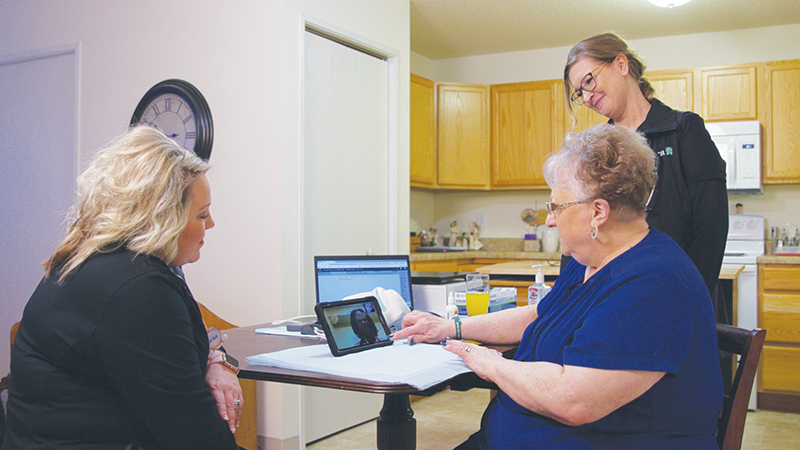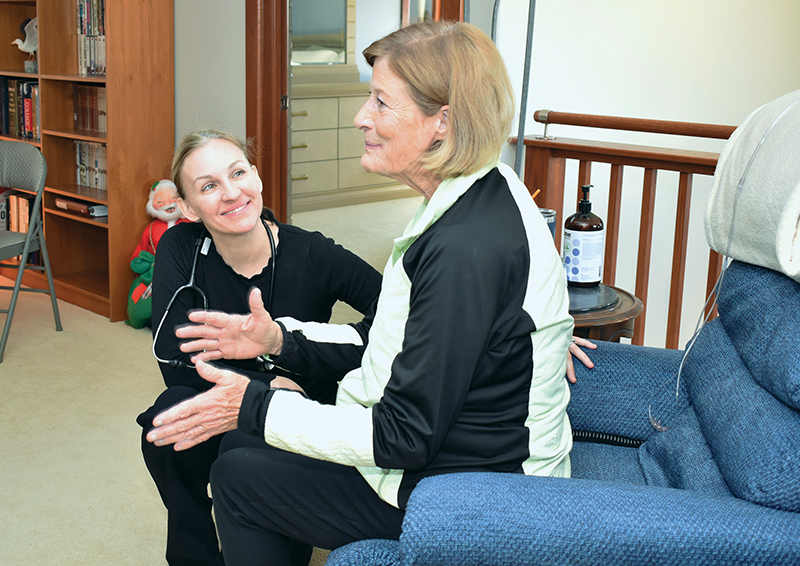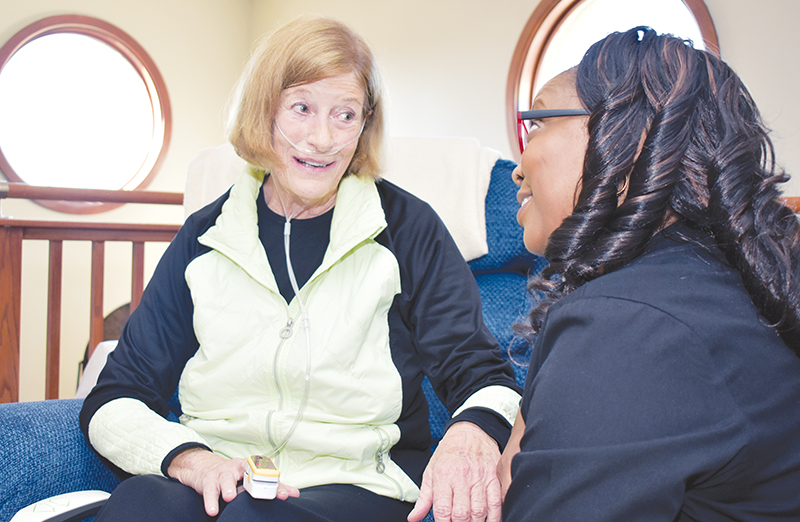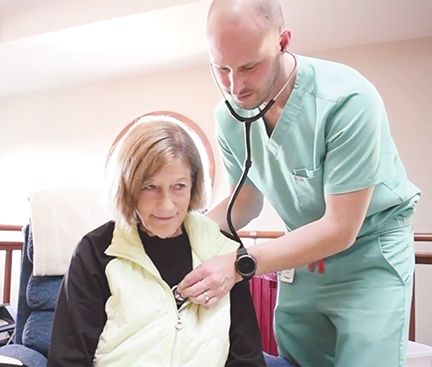
After successful starts, two Catholic health systems are diving deeper into hospital-at-home care.
Mercy launched Mercy Hospital at Home in September, offering the acute care option to patients living in and around its flagship Mercy Hospital St. Louis. By late February, Mercy Hospital at Home had admitted more than 100 patients and the system was looking ahead to bringing the care to other parts of its footprint in Arkansas, Kansas, Missouri and Oklahoma.

"It's been truly phenomenal to watch patients just flourish in the program," says Dr. Aaron Pickrell, regional medical director for Mercy Hospital at Home.
Meanwhile, Avera Health this year widened its Avera Hospital@Home program that began as a pilot in 2022 to treat patients with acute COVID without bringing them into the hospital. The program is a collaboration between Avera McKennan Hospital & University Health Center in Sioux Falls, South Dakota, and the system's home health service, Avera@Home. Hospital@Home is now an option available to adult patients with a range of conditions.

"I saw this as a unique opportunity to sort of spread our mission into the community," says Dr. Magdalene Fiddler, a hospitalist who has been medical director for Avera Hospital@Home for about a year. "How better to really reach a community than by being in their homes with them?"
The Centers for Medicare & Medicaid Services gave its approval for hospital at home care in November 2020. The move was an expansion of the Hospitals Without Walls program that it announced in March 2020 to allow the health care sector flexibility to respond to the COVID pandemic, which included easing the rules on telemedicine.
So far, the agency has given the nod for 321 hospitals across 37 states to provide acute care at home. Others in the Catholic health ministry approved for hospital-at-home care include nine CommonSpirit Health hospitals, two within Ascension and two that are part of Providence St. Joseph Health.
Proven partner
Mercy is partnering on its program with Maribel Health, a technology company that has led the design for more than a dozen hospital-at-home
launches. Pickrell says in addition to technology, Maribel brings operational expertise.
"They helped us sit down at the design table and figure out how do we build a program that has the same quality and standards for safety and experience that Mercy expects of itself and combine that with their worldwide expertise of how a hospital-at-home system ideally should run," Pickrell says.
He adds that the goal is "to create, hopefully, one of the largest hospital home systems in the country."
For now, Mercy is offering hospital-at-home care to Medicare patients, who are specifically covered by the CMS approval. The system hopes over time to see private insurers in its markets embrace the program, too.
When eligible patients who need hospitalization are seen at the Mercy Hospital St. Louis emergency room, a doctor asks if they would prefer to get the same care at home as they would in the hospital.
Mercy assesses patients who accept, to ensure that their home environment is a safe space for them to recover and for Mercy caregivers to provide treatment. Among the criteria is that patients are ambulatory and that their homes are free of excessive clutter. Of 284 patients offered enrollment through the end of March, 158 accepted and all but one passed the assessment.

Dr. Ann-Elizabeth Mohart, vice president and medical director of care transitions and medical director for hospital at home, says Mercy has "discovered that there's sort of a perfect patient population to be cared for in the home and being very selective about picking which patients are appropriate for the home environment is a key to success."

Within that perfect population, she says, are patients with certain ailments, such as lung or urinary tract infections, congestive heart failure or chronic obstructive pulmonary disease.
Mercy hospital-at-home patients get daily in-person visits from clinicians as well as virtual visits with providers. To ensure that virtual connection is possible, each patient is sent home with a tablet computer. One feature of the tablet that Mercy designed in conjunction with Maribel is a click-to-call button that connects to a Mercy virtual care provider.
In addition to the tablet, Mercy supplies any equipment necessary for a patient's treatment. "We give them everything they need," Mohart notes. "There's nothing that's required other than for the safe home environment."

Better experience
Elijah Murrell, executive director of operations for the hospital-at-home program, says Mercy has so far found that the metrics for acute patients getting home care, such as speed of recovery and readmission rates,
are as good if not better than for those admitted for in-hospital care.
"We've seen a lot of research and experience ourselves that patients recover quicker in the home," he says. "Their experience is 10 times better in the home."
Patti Dinkins of suburban St. Louis was among Mercy's early hospital at home patients. Dinkins came down with an upper respiratory infection in mid-December. She says she was initially a little hesitant when she was offered at-home rather than traditional hospital care, even though she was aware of the program because her daughter is a clinical pharmacist with Mercy.
"My first thought was, well, am I going to get as good a quality of care? I know someone will be coming over but what if it's just like the B team?" she recalls.
She nevertheless opted for the in-home care. She got several daily in-person visits from a nurse or doctor over the course of her six days of care.

"It turned out that it was totally the opposite of what I thought," she says. "They were sending these nurses and doctors that have agreed to be in this program. They are all tenured people with tons of experience."
Dinkins recovered in time to host her traditional Christmas gathering for her extended family. She thinks getting her care at home hastened her recovery.
"Usually the other times I've been in the hospital I kind of got weaker and weaker and weaker and then you got home and you have to kind of rest for a few days," she says. "I was just raring to go as soon as I got released."
Addressing pain points
Murrell says that as Mercy has developed and continues to refine its hospital-at-home program, it has been mindful about centering not just the needs of patients but also the concerns and ideas of workers.
He says a sense of inclusion and belonging among workers is a key to the program's success.

"As we develop the platform and technology, we're really developing solutions that address their pain points — the opportunity for enhanced coordination or productivity, how can we make their lives easier through better information flow, or how can we minimize risk or safety concerns through technology optimization," he says. "We get this directly from the co-workers themselves."
Fiddler with Avera says the clinicians who are providing in-home hospital care report that they are happy with the work and with having just a few patients under their care at once.
"They're going and really getting to know their patients," she says. "These patients trust them."
Avera offers Hospital@Home to any adult patient whose acute condition is treatable at home. Patients can weigh factors such as their insurance coverage and their comfort level with getting hospital care outside of a traditional setting. Fiddler estimates that about 30% of eligible patients have opted for at-home hospital care.
So far, the majority of Avera Hospital@Home patients have been 65 or older. Fiddler says that's because many of the conditions that have proven easiest to treat at home are those that most often afflict elders, such as congestive heart failure.
Under Avera's setup, a nurse practitioner visits patients daily in the home for hands-on treatment. Fiddler and other physicians provide remote care via tablets. Doctors and nurses are also available 24/7 by phone.
Comfort and rest
Over time, like Mercy, Avera's goal is to be able to expand its at-home hospital care. As of now, it is only available to patients who live within 30 miles of Avera McKennan.
Fiddler says patients give the program high marks on post-discharge surveys. She also hears praise during the course of the care, especially about how much more comfortable and restful it is to be treated at home.
"My first question when I get on camera, I ask them, 'How do you feel this experience has changed your life?'" she says. "The one biggest thing everybody tells me is like, 'Oh my gosh, I got a good night of sleep.' You cannot beat that."
